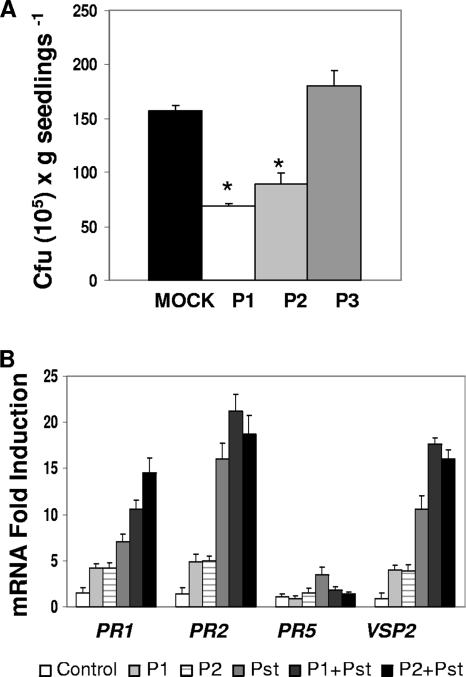FIG. 4.
Induction of defense responses in Arabidopsis seedlings by ultrashort lipopeptides. (A) Inhibition of P. syringae DC3000 multiplication. Fifteen 1-week-old seedlings were dispensed into each well of a 12-well tissue culture plate with 1 ml of B5 medium. Seedlings were treated with 1.6 nmol of the different peptides for 24 h before bacterial infection (104 CFU/ml). CFU counts of surviving bacteria were assayed 48 h after inoculation. *, significantly different from the other treatments (one-way factorial ANOVA; P ≪ 0.001). (B) Induction of plant defense genes by synthetic peptides P1 and P2. Fifteen 1-week-old seedlings were dispensed into each well of a 12-well tissue culture plate with 1 ml of B5 medium. Seedlings were treated with 1.6 nmol of the different peptides for 24 h before bacterial infection (104 CFU/ml). Total RNA was extracted 24 h after a bacterial challenge from a pool of 15 seedlings/treatment and used for quantitative RT-PCR analysis of the expression of the pathogenesis-related protein-encoding genes PR1, PR2, and PR5 and the jasmonic acid-responsive gene vsp2. n-fold induction of mRNA was compared to that in untreated seedlings (Control), to that in seedlings infected with the bacteria (P. syringae pv. tomato [Pst]) without previous peptide treatment, or to that in seedlings treated with peptides (P1 and P2) but not infected with bacteria. The results are averages of six independent replicates/treatment ± the standard errors tested by one-way factorial ANOVA, followed by TukeyHSD with P < 0.05 in comparison to the controls.

